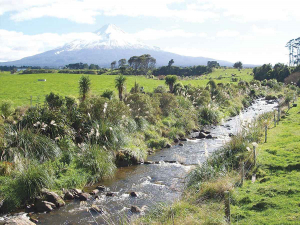Environment Canterbury urges buyers to check wastewater systems on rural properties
Buying or building a rural or semi-rural property? Make sure you know where the wastewater goes, says Environment Canterbury.
 All existing Taranaki Regional Council riparian plan fencing can remain and will be accepted as compliant.
All existing Taranaki Regional Council riparian plan fencing can remain and will be accepted as compliant.
The Taranaki Regional Council is welcoming the Government’s revised stance on freshwater regulation.
Council chairman and former Fonterra director David Macleod says the revised Essential Freshwater reforms unveiled this month validates the serious concerns raised about its original proposals.
“We all want our waterways to be healthier – we share that goal with the Government,” says MacLeod.
“However, we had major concerns about the ability of the original proposals to deliver. We told Wellington their initial plans would have brought unpredictable and likely only marginal environmental benefits, but would have taken a very heavy toll on the social and economic well-being of this region and many others.”
MacLeod says the Government is now moderating its approach and seeking to build a more worthwhile, rational, science-based freshwater regulation regime.
“We’re still working though the details. But in general, this change of stance is to be welcomed. The council’s strong and evidence-based submissions were substantially agreed with and key changes made.”
Notably, the Government has delayed any decision on a key nutrient limits pending further analysis of their worth, rather than going ahead with strict limits that one study estimated would cost $100,000 each for up to a third of the region’s farms, threatening their viability.
It has also not proceeded with proposals to universally use OverseerFM in water regulations – the council strongly advised the OverseerFM model was not fit for that purpose.
“We’re delighted the Government agrees OverseerFM is best used as originally intended - for farmers to review and improve on-farm nutrient management,” MacLeod says.
The Government has also eased up on an initial proposal to impose a blanket 5m setback for all riparian fencing, saying now that 3m is the minimum.
Importantly for Taranaki, all existing council riparian plan fencing can remain and will be accepted as compliant, which the council strongly advocated for.
The Government has also backed off what would have been harsh constraints on dairying in the Waingongoro catchment, instead progressively targeting freshwater farm plans by which dairy farmers can implement farm-specific management to improve efficiency and reduce off-site effects.
Overall, MacLeod says it’s clear the Government has taken account of many of the points made in the council’s submission.
MacLeod says that Government was firmly reminded the Taranaki region has, over time, collectively demonstrated strong commitment to improving freshwater health, taking carefully considered long-term action and spending millions of dollars on interventions of proven effectiveness.
“If anything, the original proposals threatened to undo a lot of good work and goodwill and bring hardship and deprivation to communities engaged in productive and sustainable enterprise. We are still working through the amended proposals, but we’re encouraged that the voice of reason appears to have been heard, at least in part.
“We all know we have more to do in both our rural and urban areas, but Taranaki people know how to roll up our sleeves and keep moving forward – we’ve consistently led and shown New Zealand that it is not about endlessly changing plans, policies, meetings and paper – it’s on-the-ground actions that change and improve our environment.”
Fonterra’s impending exit from the Australian dairy industry is a major event but the story doesn’t change too much for farmers.
Expect greater collaboration between Massey University’s school of Agriculture and Environment and Ireland’s leading agriculture university, the University College of Dublin (UCD), in the future.
A partnership between Torere Macadamias Ltd and the Riddet Institute aims to unlock value from macadamia nuts while growing the next generation of Māori agribusiness researchers.
A new partnership between Dairy Women’s Network (DWN) and NZAgbiz aims to make evidence-based calf rearing practices accessible to all farm teams.
Despite some trying circumstances recently, the cherry season looks set to emerge on top of things.
Changed logos on shirts otherwise it will be business as usual when Fonterra’s consumer and related businesses are expected to change hands next month.